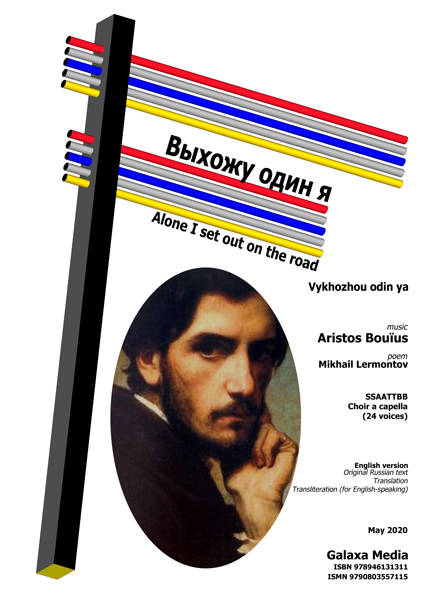

Выхожу один я на дорогу
Alone I set out on the road
Alone I set out on the road
— On a poem by Mikhail Lermontov —
| Recently there exists a version for STRING QUARTET of this composition, including a personal human statement. Click here to go directly to that page. |
Lermontov wrote this poem in 1841, in the year of his violent death in a duel in which he did no intention to shoot, but his offended opponent - the former officer Martȳnov - had this intention all the more. Lermontov is said to have spoken these fatal words about Martȳnov, who was also present as the listener at a concert by the prince Trubetskoĭ when the prince had struck the last accord: 'Un montagnard au grand poignard' (A mountain dweller with a big dagger). See an article by Bert Lantink in the Dutch paper De Volkskrant of 19 July 1997.
Yet many people think that Lermontov really wanted to die by accepting the challenge for this duel with Martȳnov. We will never know. Personally I think that Mikhail Lermontov was so convinced that his opponent would not shoot that he took the risk.
As far as I am concerned, this poem is in the tradition of his passionate romance-driven life, like almost all his other poems.
According to Youtube, this poem has been put to music more often. I have seen the names, but intentionally never have listened to them, to let its music not getting in the way of my own interpretation and feeling. Moreover, there seems to be a difference in approach to the music: (pop) ballad versus my classical approach with my own idiom.
My translation is not intended to create a new English poem. It is intended as a reference for the musicians and listeners, which I can imagine want to know what the poem is all about.
All the more because my music is based on the text in the same tradition as during the Renaissance. You could call my approach "arioso" - the text is important and is repeated appropiately (no, not inappropriately) for the sake of beautiful music.
This lied is intended to be sung in Russian. The score contains a meticulous transliteration as well as a pronunciation guide for English singers who do not speak Russian. For a good understanding of the text, a translation has been added in the score (see also below).
Yet many people think that Lermontov really wanted to die by accepting the challenge for this duel with Martȳnov. We will never know. Personally I think that Mikhail Lermontov was so convinced that his opponent would not shoot that he took the risk.
As far as I am concerned, this poem is in the tradition of his passionate romance-driven life, like almost all his other poems.
According to Youtube, this poem has been put to music more often. I have seen the names, but intentionally never have listened to them, to let its music not getting in the way of my own interpretation and feeling. Moreover, there seems to be a difference in approach to the music: (pop) ballad versus my classical approach with my own idiom.
My translation is not intended to create a new English poem. It is intended as a reference for the musicians and listeners, which I can imagine want to know what the poem is all about.
All the more because my music is based on the text in the same tradition as during the Renaissance. You could call my approach "arioso" - the text is important and is repeated appropiately (no, not inappropriately) for the sake of beautiful music.
This lied is intended to be sung in Russian. The score contains a meticulous transliteration as well as a pronunciation guide for English singers who do not speak Russian. For a good understanding of the text, a translation has been added in the score (see also below).
Aristos
P.S .: Transliteration means literally changing the letters of the Cyrillic alphabet more or less into our Latin letters. Transcription means that when rendering the text in Latin characters, the proper pronunciation is also included. Example: "большой" you know from the theater in St. Petersburg, the Bolshoï Theater. This is an (almost complete) transliteration. For a transcription this would be "Baljšoi" because:
A) syllables with an o in Russian words that have no accent, are pronounced as a. You can already feel it coming: the accent on this word is on the second syllable,
B) because of the j behind the l, that l is no longer harsh in pronunciation but softer,
C) because a š is a symbol of the sh in for example the word sheet.
Seems complicated, but in the end there are only a few rules for singers to learn to pronounce Russian as flawlessly as possible - in addition to the musical memory, there is still room for the lyrics!
A) syllables with an o in Russian words that have no accent, are pronounced as a. You can already feel it coming: the accent on this word is on the second syllable,
B) because of the j behind the l, that l is no longer harsh in pronunciation but softer,
C) because a š is a symbol of the sh in for example the word sheet.
Seems complicated, but in the end there are only a few rules for singers to learn to pronounce Russian as flawlessly as possible - in addition to the musical memory, there is still room for the lyrics!
The poem
Выхожу один я на дорогу,Сквозь туман кремнистый путь блестит.
Ночь тиха. Пустыня внемлет Богу,
и звезда с звездою говорит.
В небесах торжественно и чудно!
Спит земля в сияньи голубом.
Что же мне так больно и так трудно?
Жду ль чего? Жалею ли о чём?
Уж не жду от жизни ничего я,
и не жаль мне прошлого ничуть.
Я ищу свободы и покоя!
Я б хотел забыться и заснуть!
Но не тем холодным сном могилы.
Я б желал навеки так заснуть,
чтоб в груди дремали жизни силы,
чтоб, дыша, вздымалась тихо грудь.
Чтоб всю ночь, весь день, мой слух лелея,
про любовь мне сладкий голос пел.
Надо мной чтоб, вечно зеленея,
тёмный дуб склонялся и шумел.
The translation
Alone I set out on the roadd,the pebbles on the road shine through the fog.
The night is peaceful. The void seems to be waiting for God and a star is talking to other stars.
It is wonderful and festive in the sky!
Earth is asleep under the sky-blue light.
Then why do I feel so bad and depressed?
Am I waiting for something? Do I regret anything?
I don't expect anything anymore from life and I have absolutely no regrets about the past.
I seek freedom and peace!
I would like to sleep without worries!
But not that sleep of grave and chill.
I wish to fall asleep forever,
so that the force of life slumbers in my chest,
so that my breath makes the chest rise gently.
So that all night, all day, my hearing
is filled with a gentle voice of love.
I want a dark oak that stays green forever
leaning and rustling over me.
(© Translation: Aristos)
Below you can get an impression of the music.
I advise you not to listen to the music via a mobile phone, tablet or laptop. That could turn out to be a disappointment, unless you use very good headphones. For a reasonably acceptable experience, a computer with a good sound system is required!
Please note:

This music is an electronic representation and is therefore not comparable to a human version!
For example, one does not hear the words of the sung text by the choir, but only "aah" and "ooh".
The instruments, on the other hand, are quite realistic thanks to the latest electronics.
It remains, however, that the whole of the interpretation of the conductors/musicians is missing and therefore may sound somewhat sterile.
It remains, however, that the whole of the interpretation of the conductors/musicians is missing and therefore may sound somewhat sterile.
 |
© The complete copyright of the music (also this electronic version) has been deposited. This means that you can only listen but not use it nor partially, nor completely for your own purposes. Let alone that you use it for your own performances or productions.
For citation rights please contact the publisher and/or the Buma/Stemra organization in the Netherlands. |
Please keep in mind that the composition is predominantly piano (soft) in character but carries some forte (loud) peaks. So please set your sound level soft at the beginning. This also benefits the slow tempo and thus the meditative character of the music.
0:00
0:00
Niks gevonden!
Please, subscribe to the list on YouTube of my work (channel).
You can listen to the works wherever you have Internet, one after the other or individually.
If you subscribe, you will receive an email from Youtube when I have added a composition.
Click on the icon below.
You can listen to the works wherever you have Internet, one after the other or individually.
If you subscribe, you will receive an email from Youtube when I have added a composition.
Click on the icon below.

We did our utmost to make this site as simple and fast as possible. We recommend that you use a computer or tablet, even though the site adaps itself as much as possible to the dimensions of your screen and can therefore also be viewed on a mobile.
To listen to the compositions on this site, a computer and a good audio system are essential.
Site created by: © Galaxa Design - copying the site, or any part of the content, music or images is prohibited without prior written permission of the publisher. To contact the publisher, please use Galaxa Media Publishing House. To contact the composer use Aristos Bouïus.
Site created by: © Galaxa Design - copying the site, or any part of the content, music or images is prohibited without prior written permission of the publisher. To contact the publisher, please use Galaxa Media Publishing House. To contact the composer use Aristos Bouïus.





